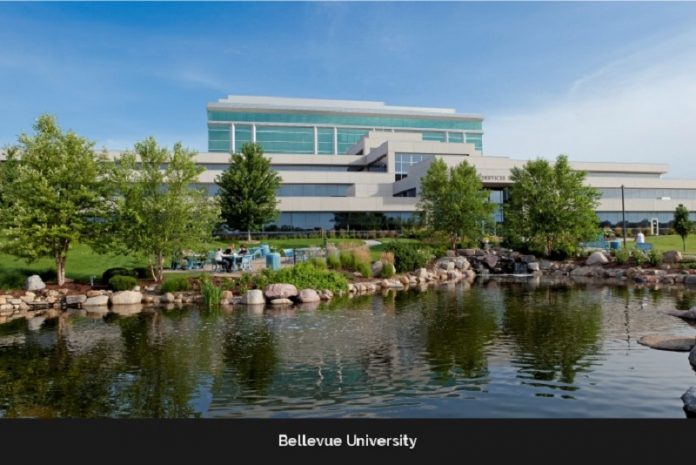The Bellevue University Center for Cybersecurity Education (CCE) is dedicated to integrating cybersecurity interdisciplinary education and skill development.
Situated with Bellevue University’s College of Science and Technology, the Center provides a state-of-the-art cybersecurity education for students interested in careers in data sciences, mathematics, business analytics, as well as cybersecurity, systems network and administration, and related computer science and IT fields.
Through the College of Science and Technology, the university offers Bachelor’s and Master’s in Cybersecurity degrees, cybersecurity certificates of completion, as well as defined cybersecurity emphasis and concentration areas in related degree programs, such as Computer Information Systems, Management Information Systems, MBA, and Strategic Finance.
For Doug Rausch, Program Director, Cybersecurity, and Maenner Endowed Chair, the challenge is in structuring a degree program, while offering students the most flexibility, in a field as wide as cybersecurity.
Both of the Bachelor’s and Master’s in Cybersecurity degrees are structured as a core/emphasis pairing, and all students within Bellevue University’s CCE receive foundation cybersecurity concepts in the core curriculum. These topics are instrumental to student success, regardless of the area of cybersecurity in which they desire a career.
Students then select a cybersecurity emphasis area, aligned with the NIST Cybersecurity Workforce Framework, so students and employers have a common framework to match needed skills.
Rausch notes that there are currently three emphasis areas formalized in the BS program; Protect and Defend, Securely Provision, and Oversee and Govern. In the MS program, students are able to select electives that align with the same three emphasis areas, to round out their program.
Creating a high-quality, market-relevant cybersecurity program
Dr. Mary Dobransky, Dean of the College of Science and Technology, observes that over the last 10 years, the number of students enrolled in the College of Science and Technology has quadrupled. In addition to increasing faculty and staff resources, many new programs have been added.
Originally, the college offered a few information technology programs. This has since expanded to encompass multiple technology programs, as well as programs in science, health, security, math, business analytics, graphic design, project management, and data science. The technology programs have experienced tremendous growth, and cybersecurity alone has more than 1,300 students currently enrolled.
Dr. Dobransky also notes that, because Bellevue University was among the first universities to create a cybersecurity major, there were not many guidelines available. To meet this challenge, they assembled a group of experts from government, business, technology, and academia, to collaborate on creating the program.
The result was a high-quality, market-relevant program, designed to produce graduates who were ready to help their organizations create and implement cybersecurity best practices. Part of the success of the cybersecurity program has been a cross-sector advisory board that helps to ensure the most up-to-date curriculum.
Blending current skills with the ability to learn new ones
Dr. Dobransky and Rausch both point out that these challenges really mirror what cybersecurity organizations are struggling with in their day-to-day operations. Finding qualified personnel is essential for keeping the program, and thus the courses, reflective of the current environment.
The shortfall in cybersecurity professionals is a well-known challenge, and as an educational institution, Rausch notes that Bellevue University, in building its faculty, is in competition for the same pool of professionals that are being sought after by every other cybersecurity function in an organization.
What they do offer is a way, not just for people to give back to the community, but to become a multiplying factor. Dr. Dobransky notes that the CCE has very skilled faculty with the expertise to secure systems, identify threats, and respond to events.
But they are still only individuals, and we need more experts. Faculty can pass their knowledge and approach to cybersecurity onto many other individuals, each of whom will go out, and help strengthen organizations.
Rausch observes that those who want to give back, increase their contribution to cybersecurity, and do it in a very flexible work environment, find teaching in Bellevue University’s program a very rewarding pursuit. He also points out that keeping the program current is an ongoing focus, because they teach a mix of foundational concepts and hands-on applications.
He says the university’s faculty has a high degree of ongoing industry experience, and they foster a very collaborative environment. For example, a faculty member will often bring a new tool to the attention of Center leadership, or recommend course updates to better reflect the latest threat they are dealing with in industry.
They also teach students that the tools they use today will not be the tools they use tomorrow. What will make them successful, however, is the ability to research and learn new tools and techniques as they are developed, but not lose sight of the foundational concepts of cybersecurity. Rausch notes that it is that blend of current skills and the ability to learn, that makes their students successful.
Collaborating with the NSA and community colleges
Bellevue University has long been a leader in online education and has an incredibly geographically dispersed student body. The institution’s goal has been to provide students, regardless of location, the delivery of instruction best suited to the point they are at in their professional journey.
This has also presented the cybersecurity program with some unique challenges and opportunities. The institution develops and hosts their own virtual labs to provide hands-on skills that are tightly integrated into its courses. The programs offer emphasis areas to address specific workforce needs.
The CCE’s Partnership Network also enables them to work closely with community colleges to provide “what’s next” options for two-year degree recipients, so they can take full advantage of coursework they’ve already completed.
The CCE has been designated a National Center of Academic Excellence in Cyber Defense Education by the National Security Agency (NSA) (CAE-CDE) for the academic years 2022 to 2027. These relationships give the center and its team a large collaborative body with which to exchange the lessons learned.
Creating a state-of-the-art cybersecurity program
Rausch notes the crucial importance of having a cybersecurity program that is reflective of what students will face once they graduate. The members of the faculty are either all from industry or are currently actively engaged with industry.
The CCE also has a fantastic industry advisory board they meet with regularly. Many of the students are already working in the cybersecurity field and bring questions and what-if scenarios to the staff.
Rausch states that all these avenues are utilized to highlight and address threats, processes, and tools for addressing those threats, as well as governance, risk, and compliance trends organizations are facing.
The CCE’s collaboration with other CAE institutions also allows them to share these trends and incorporate other methods for providing a state-of-the-art cybersecurity education.
The core curriculum components of the CCE’s cybersecurity program
Rausch explains that the core curriculum components of the CCE’s cybersecurity program focus first on foundational cybersecurity concepts that students will need, regardless of the area of the profession they decide to work in.
These are crucial elements such as confidentiality, integrity, and availability, application of security controls, governance methods, risk analysis, and compliance activities. Hands-on application of these concepts is important, so students gain experience through virtual labs.
Finally, communication skills are critical, as a cybersecurity professional must be able to summarize threats and vulnerabilities, and the mitigations needed to address them. They must communicate risk, consider business objectives, and contribute to the decision-making process. So, the faculty works with students to develop their communication skills.
Rausch notes that the learning modalities that students engage in to earn their cybersecurity degrees include in-person classes, 100% online courses, as well as other modalities which include students on campus and students participating from remote locations. The CCE is constantly exploring technologies and ways to offer high-quality educational experience.
Milestones in the development of the CCE’s cybersecurity education program
Rausch notes that the CCE cybersecurity program began with its Master’s degree in the spring of 2011. This was followed by a Bachelor’s program in the Fall of 2012. The program offerings were expanded in 2017, with the addition of cohort options in both the BS and MS programs.
In 2012, the CCE was first designated as an NSA Center of Academic Excellence. In 2022, the institution received its most recent re-designation continuing its role as a National Center of Academic Excellence in Cybersecurity Defense.
The technology base has advanced along with the program, adding, and then expanding, the use of virtualized labs. The most recent expansion to the virtual lab expansion occurred with the addition of the Courtnage Intelligence Systems Lab to the Bellevue University campus.
A state-of-the-art educational facility, the Courtnage Intelligence Systems Lab enables students to gain knowledge while immersed in a security and network operations center.
Staying up to date with cybersecurity skills needed in industry
Rausch notes that the CCE has an active professional development program, encouraging academic and vendor-provided courses, as well conference attendance and certifications. The University provides professional development funds for all full-time faculty members, as well as for targeted skills with its part-time faculty.
The CCE continues to formalize and adapt its emphasis areas to workforce development needs that also guide creation of certificates that address specific organizational needs, either for initial skills acquisition short of a degree, or skill broadening.
Rausch also observes that, since cybersecurity professionals often find themselves needing to apply their skills in rapidly evolving situations, with less than full information available, the CCE is adding more scenario-based training to their programs.
Scenario-based training, through activities such as table-top exercises, helps students develop their critical thinking skills. Dr. Dobransky points out that the College of Science and Technology is developing a modern computer science program focused on critical technology skills, including those in the CCE.
For more information on Bellevue University’s Center for Cybersecurity Education, please visit https://www.bellevue.edu/degrees/center-for-cybersecurity-education/cce





